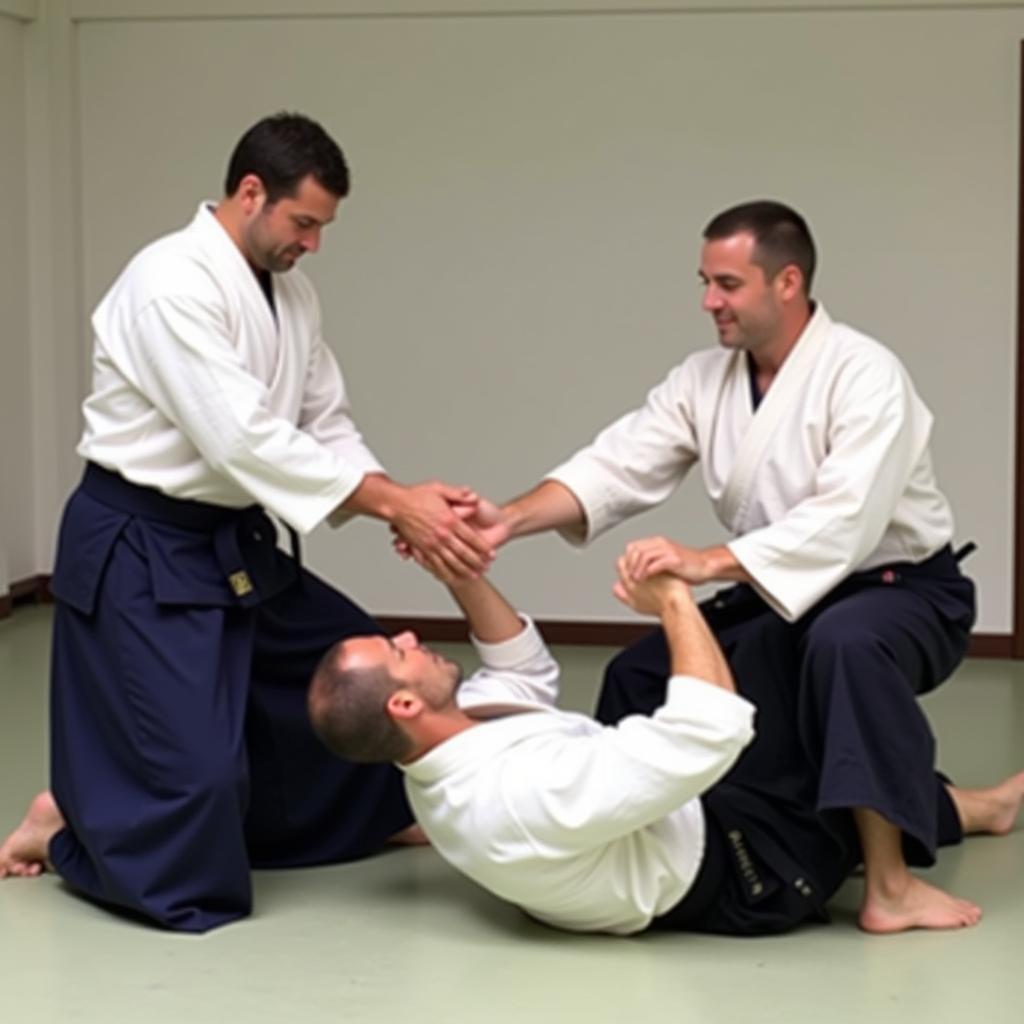Aikido Is Fake, a claim often encountered online. But is this truly the case? This article delves into the complexities surrounding Aikido’s effectiveness, examining both the criticisms and the arguments defending its practicality. We’ll explore the history, principles, and training methods of Aikido to understand why it is sometimes perceived as ineffective and what value it actually offers.
Understanding the “Aikido Is Fake” Argument
The perception that “aikido is fake” stems primarily from its depiction in movies and demonstrations showcasing seemingly unrealistic techniques. These often involve highly compliant opponents, creating the impression of effortless throws and locks that wouldn’t work in a real-life scenario. Furthermore, the emphasis on circular movements and flowing techniques can appear impractical against aggressive, unpredictable attacks. Critics often compare Aikido unfavorably to other martial arts known for their effectiveness in combat sports, fueling the narrative of its ineffectiveness.
Another common criticism centers around the lack of sparring or resistance training in some Aikido schools. Without regular practice against resisting opponents, practitioners may develop a false sense of security, believing their techniques will work when they haven’t been tested under pressure. This contributes to the perception that Aikido is not a practical martial art for self-defense.
The Core Principles and Philosophy of Aikido
Aikido, translated as “the way of harmonizing energy,” is rooted in a philosophy of non-violence and self-improvement. It emphasizes blending with an attacker’s energy rather than meeting force with force. This principle, often misunderstood, is a cornerstone of Aikido’s approach to self-defense. While seemingly passive, it aims to redirect and control an attacker’s momentum, neutralizing the threat without inflicting unnecessary harm.
 Aikido principles: blending with attacker's energy
Aikido principles: blending with attacker's energy
Aikido Training and its Practical Applications
Aikido training involves a wide range of techniques, including throws, joint locks, and immobilizations. These techniques are designed to control and subdue an attacker, not necessarily to inflict damage. While some schools may lack realistic sparring, others incorporate resistance training and pressure testing to prepare students for real-world scenarios. The effectiveness of Aikido depends largely on the quality of instruction and the dedication of the practitioner.
Debunking the Myth: Is Aikido Truly Ineffective?
While the “aikido is fake” claim has gained traction, it’s a simplification of a complex subject. Aikido’s effectiveness is not a black and white issue. Its focus on blending and redirecting energy can be highly effective in certain situations, particularly against untrained attackers. Moreover, the discipline and body control developed through Aikido training can be beneficial for overall fitness and self-confidence.
It’s crucial to recognize that Aikido is not solely about fighting. Its philosophy emphasizes personal development, conflict resolution, and self-improvement. While its combat effectiveness may be debated, its value extends beyond self-defense, offering practitioners a path to physical, mental, and spiritual growth.
Conclusion
The claim that “aikido is fake” is often based on misconceptions and incomplete understanding. While some criticisms are valid, Aikido offers a unique approach to self-defense and personal development. Its effectiveness depends on the quality of training and the individual’s commitment. Aikido may not be suitable for everyone, but it offers valuable lessons and benefits that extend beyond combat.
FAQ
- Is Aikido effective in a street fight?
- How long does it take to become proficient in Aikido?
- What are the key differences between Aikido and other martial arts?
- Can Aikido be used for self-defense by women?
- Is Aikido a good workout?
- What are the benefits of Aikido beyond self-defense?
- How do I find a reputable Aikido school?
Situations for these FAQ.
The FAQ addresses common concerns regarding Aikido’s practicality, training requirements, and benefits. It also provides guidance for finding reputable training.
Related Articles
- The Philosophy of Aikido
- Aikido Training Methods
- Comparing Aikido with other martial arts
When needing support, contact us at Phone Number: 0909802228, Email: doibongda@gmail.com Or visit us at: 101 Đ. Lý Chiêu Hoàng, Phường 10, Quận 6, Hồ Chí Minh, Việt Nam. We have a 24/7 customer service team.